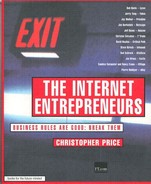The formation of Amazon
Bezos chose the name Amazon.com because it is 'the earth's biggest river and we would offer the earth's biggest selection.' What about the Nile, I ask?
'Well, the Nile is the longest river, but it is actually a creek in terms of volume compared to the Amazon. Did you know that 20 percent of the world's fresh water is found in the Amazon basin?'
Once the fixed costs of a website had been surpassed, profit margins would soar
Bezos, 36, came up with the Amazon concept while he was working as a strategist for a consultancy in Florida. The idea was a simple one: as the internet expanded, a retailer would be able to reach customers more easily and cheaply through the new medium. Bezos figured that for a bricks and mortar chain of stores to double its sales, it would take a colossal investment to build an equal number of new stores. However, for an on-line retailer, scalability was not going to be a problem in terms of capability or cost. Once the fixed costs of a website had been surpassed, profit margins would soar.
So Bezos quit his job and with his wife flew down to Fort Worth, Texas. Here, he picked up his father's 1988 Chevie Blazer and took off for Seattle, where they figured there would be a surfeit of web-hungry volunteers.
While MacKenzie, Mrs Bezos, drove, her husband bashed out the business plan on a laptop. There were no great ambitions when the company started. Bezos hoped that the on-line bookseller-cum-retailer would find a niche and become a thriving small business. 'I told all of our early investors, who were friends and family members, that they would lose their money for sure.' The drain starts, 'Anybody who could have predicted what would have happened would have been institutionalized!' He shakes with laughter.
Bezos famously targeted the book market as the first to experience Amazon's on-line challenge. His passion for excellent customer service meant that he refused to leave any element of the book-buying experience to others: Amazon would order, collect, and deliver all its customers' orders. This entailed building warehouses and employing a whole host of sales staff. In effect, Bezos's answer to the book industry was not so revolutionary, he was simply replacing one ordering system, the bookshop or mail order, with another, the internet. The rest of the system was the same. Except Bezos counted on the internet slashing costs, enabling Amazon to offer hefty discounts to its customers. Low prices were one element; a second to none service and great customer experience were the other.
It was the potential that Bezos unleashed through Amazon that enabled the company to quickly go public and saw the share price soar. Millions of people flocked to the site - and stayed. Amazon's diligence in creating a destination that stimulated book buyers is sometimes overlooked in the face of its discounting reputation. Indeed, it has increased sales and customers, despite the resolute challenge from other discount operators and high street names with their own web presence. It is an issue Bezos is keen to explain.
'I think there is one answer as to why we have been so successful and it is extremely simple in theory, but very hard to do in practice, and that is we are obsessed more than any other company with the customer experience. Every aspect of it.
'So when you first hear about Amazon from a friend, what you are hearing is part of the customer experience. All the way to when you receive the package, how easy it is to open, how easy was the website to use - things like one-click shopping, store-wide sales rankings, gift clicking, easy browsing…'
5 ways… Jeff Bezos broke the rules
|
Bezos lists a whole host of other plusses of the Amazon experience: 'All these things we incorporated to make it easy - no matter what you do - to find the thing you're looking for, and then to be able easily and quickly to purchase it. That sort of miniscule focus on customer experience is the reason why we have been so successful.' He continues: 'There are four things that internet customers care about - selection, ease of use, price and service, and you have to be excellent in all four of those areas. You can't pick one to leave out, and if you do you will not be successful.'
This, he believes, is doubly important in an internet business: 'Focussing on customer experience is the most important thing in any business, but it's especially important on the internet because word of mouth is more powerful on-line.' He sees this as a positive force, encouraging better service from internet businesses, because poor performances can quickly lead to demise, such is the power of the medium.
